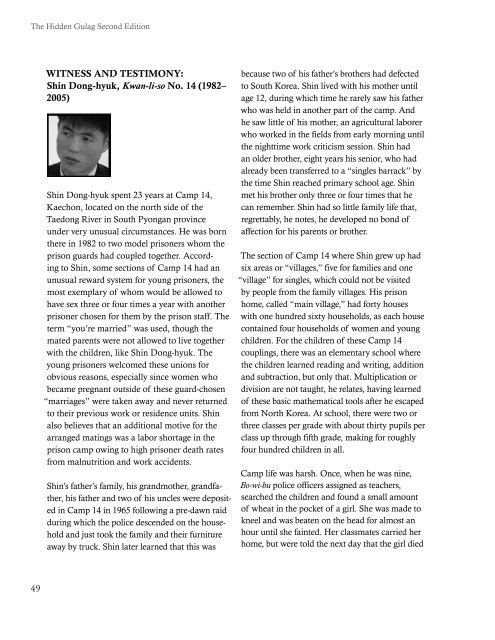The Hidden Gulag - US Committee for Human Rights in North Korea
The Hidden Gulag - US Committee for Human Rights in North Korea
The Hidden Gulag - US Committee for Human Rights in North Korea
Create successful ePaper yourself
Turn your PDF publications into a flip-book with our unique Google optimized e-Paper software.
<strong>The</strong> <strong>Hidden</strong> <strong>Gulag</strong> Second EditionWITNESS AND TESTIMONY:Sh<strong>in</strong> Dong-hyuk, Kwan-li-so No. 14 (1982–2005)Sh<strong>in</strong> Dong-hyuk spent 23 years at Camp 14,Kaechon, located on the north side of theTaedong River <strong>in</strong> South Pyongan prov<strong>in</strong>ceunder very unusual circumstances. He was bornthere <strong>in</strong> 1982 to two model prisoners whom theprison guards had coupled together. Accord<strong>in</strong>gto Sh<strong>in</strong>, some sections of Camp 14 had anunusual reward system <strong>for</strong> young prisoners, themost exemplary of whom would be allowed tohave sex three or four times a year with anotherprisoner chosen <strong>for</strong> them by the prison staff. <strong>The</strong>term “you’re married” was used, though themated parents were not allowed to live togetherwith the children, like Sh<strong>in</strong> Dong-hyuk. <strong>The</strong>young prisoners welcomed these unions <strong>for</strong>obvious reasons, especially s<strong>in</strong>ce women whobecame pregnant outside of these guard-chosen“marriages” were taken away and never returnedto their previous work or residence units. Sh<strong>in</strong>also believes that an additional motive <strong>for</strong> thearranged mat<strong>in</strong>gs was a labor shortage <strong>in</strong> theprison camp ow<strong>in</strong>g to high prisoner death ratesfrom malnutrition and work accidents.Sh<strong>in</strong>’s father’s family, his grandmother, grandfather,his father and two of his uncles were deposited<strong>in</strong> Camp 14 <strong>in</strong> 1965 follow<strong>in</strong>g a pre-dawn raiddur<strong>in</strong>g which the police descended on the householdand just took the family and their furnitureaway by truck. Sh<strong>in</strong> later learned that this wasbecause two of his father’s brothers had defectedto South <strong>Korea</strong>. Sh<strong>in</strong> lived with his mother untilage 12, dur<strong>in</strong>g which time he rarely saw his fatherwho was held <strong>in</strong> another part of the camp. Andhe saw little of his mother, an agricultural laborerwho worked <strong>in</strong> the fields from early morn<strong>in</strong>g untilthe nighttime work criticism session. Sh<strong>in</strong> hadan older brother, eight years his senior, who hadalready been transferred to a “s<strong>in</strong>gles barrack” bythe time Sh<strong>in</strong> reached primary school age. Sh<strong>in</strong>met his brother only three or four times that hecan remember. Sh<strong>in</strong> had so little family life that,regrettably, he notes, he developed no bond ofaffection <strong>for</strong> his parents or brother.<strong>The</strong> section of Camp 14 where Sh<strong>in</strong> grew up hadsix areas or “villages,” five <strong>for</strong> families and one“village” <strong>for</strong> s<strong>in</strong>gles, which could not be visitedby people from the family villages. His prisonhome, called “ma<strong>in</strong> village,” had <strong>for</strong>ty houseswith one hundred sixty households, as each houseconta<strong>in</strong>ed four households of women and youngchildren. For the children of these Camp 14coupl<strong>in</strong>gs, there was an elementary school wherethe children learned read<strong>in</strong>g and writ<strong>in</strong>g, additionand subtraction, but only that. Multiplication ordivision are not taught, he relates, hav<strong>in</strong>g learnedof these basic mathematical tools after he escapedfrom <strong>North</strong> <strong>Korea</strong>. At school, there were two orthree classes per grade with about thirty pupils perclass up through fifth grade, mak<strong>in</strong>g <strong>for</strong> roughlyfour hundred children <strong>in</strong> all.Camp life was harsh. Once, when he was n<strong>in</strong>e,Bo-wi-bu police officers assigned as teachers,searched the children and found a small amountof wheat <strong>in</strong> the pocket of a girl. She was made tokneel and was beaten on the head <strong>for</strong> almost anhour until she fa<strong>in</strong>ted. Her classmates carried herhome, but were told the next day that the girl died49



